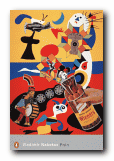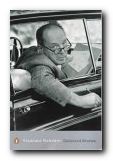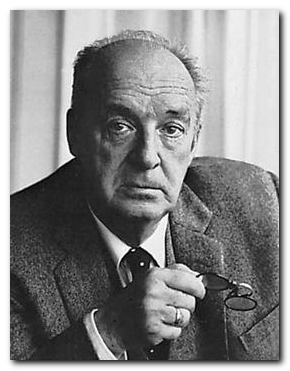tutorial commentary, study resources, plot, and web links
The Fight first appeared in September 1925 in the Russian emigré newspaper Rul’ published in Berlin. The paper had been established by Vladimir Nabokov’s father in 1921. Its first publication in English translation was in The New Yorker for February 1985.
In his list of stories collected for publication in single volume form, Nabokov listed The Fight under the heading ‘Bottom of the Barrel’, but it was included in the Collected Stories of Vladimir Nabokov published by Alfred A. Knopf in New York in 1995. It also seems to me no less worthy than many of the other shorter and lighter pieces from the early period of his output as a writer.
Vladimir Nabokov
The Fight – critical commentary
This is one of a number of stories set in Berlin which combines detailed observations of everyday life with a curious sense of emotional detachment. Nabokov had spent the years 1919 to 1923 as a student at Trinity College Cambridge and then settled in Berlin as the first major centre of Russian emigration. He earned a precarious living teaching English, giving tennis lessons, and working as a walk-on extra in the film industry.
It’s almost as if he was reassuring himself that the appreciation of aesthetic phenomena was a bulwark against the existential despair which engulfed so many of his uprooted fellow countrymen. But the story is also an early example of two literary features which Nabokov returned to again and again throughout his career – reflections on aesthetic pleasure and self-referentiality in fiction.
The narrator first of all quits the scene of the conflict before it is ended:
I neither know nor wish to know who was wrong and who was right in this affair. The story could have been given a different twist, and made to depict compassionately how a girl’s happiness had been mortified for the sake of a copper coin
So – after a conventional account of events, Nabokov suddenly breaks the unspoken contract with his readers and has his narrator reveal himself as conscious of creating a fictional narrative. This is fiction reflecting upon itself – but he goes on to offer an alternative subject matter in the form of the specific and momentary effects available in the details of everyday life:
Or perhaps what matters is not the human pain or joy at all, but, rather, the play of shadow and light on a live body, the harmony of trifles assembled on this particular day, at this particular moment, in a unique and inimitable way.
The Fight – study resources
![]() The Cambridge Companion to Nabokov – Amazon UK
The Cambridge Companion to Nabokov – Amazon UK
![]() Zembla – the official Vladimir Nabokov web site
Zembla – the official Vladimir Nabokov web site
![]() The Paris Review – 1967 interview, with jokes and put-downs
The Paris Review – 1967 interview, with jokes and put-downs
![]() First editions in English – Bob Nelson’s collection of photographs
First editions in English – Bob Nelson’s collection of photographs
![]() Vladimir Nabokov at Wikipedia – biographical notes, links
Vladimir Nabokov at Wikipedia – biographical notes, links
![]() Vladimir Nabokov at Mantex – tutorials, web links, study materials
Vladimir Nabokov at Mantex – tutorials, web links, study materials
![]() Brian Boyd, Vladimir Nabokov: The Russian Years, Princeton University Press, 1990.
Brian Boyd, Vladimir Nabokov: The Russian Years, Princeton University Press, 1990.
![]() Brian Boyd, Vladimir Nabokov: The American Years, Princeton University Press, 1991.
Brian Boyd, Vladimir Nabokov: The American Years, Princeton University Press, 1991.
![]() Laurie Clancy, The Novels of Vladimir Nabokov. New York: St. Martin’s Press, 1984.
Laurie Clancy, The Novels of Vladimir Nabokov. New York: St. Martin’s Press, 1984.
![]() Neil Cornwell, Vladimir Nabokov: Writers and their Work, Northcote House, 2008.
Neil Cornwell, Vladimir Nabokov: Writers and their Work, Northcote House, 2008.
![]() Jane Grayson, Vladimir Nabokov: An Illustrated Life, Overlook Press, 2005.
Jane Grayson, Vladimir Nabokov: An Illustrated Life, Overlook Press, 2005.
![]() Norman Page, Vladimir Nabokov: Critical Heritage, London: Routledge, 1997
Norman Page, Vladimir Nabokov: Critical Heritage, London: Routledge, 1997
![]() David Rampton, Vladimir Nabokov: A Critical Study of the Novels. New York: Cambridge University Press, 1984.
David Rampton, Vladimir Nabokov: A Critical Study of the Novels. New York: Cambridge University Press, 1984.
![]() Michael Wood, The Magician’s Doubts: Nabokov and the Risks of Fiction. Princeton, New Jersey: Princeton University Press, 1995.
Michael Wood, The Magician’s Doubts: Nabokov and the Risks of Fiction. Princeton, New Jersey: Princeton University Press, 1995.
The Fight – plot summary
An un-named narrator is living in Berlin. In the heat of summer he goes each day to bathe in a nearby lake. There he sees an elderly German man who is also a daily visitor. When he goes for a drink in the evening, the man turns out to be Krause, the keeper of a tavern who works there with his daughter Emma.
The narrator becomes a regular visitor to the tavern and realises that one of the other customers is Emma’s lover. When the lover helps himself to a drink at the bar and tries to leave without paying, Krause follows him into the street and a fight breaks out. The narrator watches the two men brawling for a while, then goes back into the tavern to retrieve his hat, comforts Emma, then leaves without knowing the outcome of the conflict. Instead he reflects on a number of different number of ways the story might have ended.
![]() Vladimir Nabokov: The Collected Stories – Amazon UK
Vladimir Nabokov: The Collected Stories – Amazon UK
![]() Vladimir Nabokov: The Collected Stories – Amazon US
Vladimir Nabokov: The Collected Stories – Amazon US
Other work by Vladimir Nabokov
 Pnin is one of his most popular short novels. It deals with the culture clash and catalogue of misunderstandings which occur when a Russian professor of literature arrives on an American university campus. Like many of Nabokov’s novels, the subject matter mirrors his life – but without ever descending into cheap autobiography. This is a witty and tender account of one form of naivete trying to come to terms with another. This particular novel has always been very popular with the general reading public – probably because it does not contain any of the dark and often gruesome humour that pervades much of Nabokov’s other work.
Pnin is one of his most popular short novels. It deals with the culture clash and catalogue of misunderstandings which occur when a Russian professor of literature arrives on an American university campus. Like many of Nabokov’s novels, the subject matter mirrors his life – but without ever descending into cheap autobiography. This is a witty and tender account of one form of naivete trying to come to terms with another. This particular novel has always been very popular with the general reading public – probably because it does not contain any of the dark and often gruesome humour that pervades much of Nabokov’s other work.
![]() Buy the book at Amazon UK
Buy the book at Amazon UK
![]() Buy the book at Amazon US
Buy the book at Amazon US
 Collected Stories Nabokov is also a master of the short story form, and like many writers he tried some of his literary experiments there first, before giving them wider reign in his novels. This collection of sixty-five complete stories is drawn from his entire working life. They range from the early meditations on love, loss, and memory, through to the later technical experiments, with unreliable story-tellers and the games of literary hide-and-seek. All of them are characterised by a stunning command of language, rich imagery, and a powerful lyrical inventiveness.
Collected Stories Nabokov is also a master of the short story form, and like many writers he tried some of his literary experiments there first, before giving them wider reign in his novels. This collection of sixty-five complete stories is drawn from his entire working life. They range from the early meditations on love, loss, and memory, through to the later technical experiments, with unreliable story-tellers and the games of literary hide-and-seek. All of them are characterised by a stunning command of language, rich imagery, and a powerful lyrical inventiveness.
![]() Buy the book at Amazon UK
Buy the book at Amazon UK
![]() Buy the book at Amazon US
Buy the book at Amazon US
© Roy Johnson 2014
More on Vladimir Nabokov
More on literary studies
Nabokov’s Complete Short Stories
